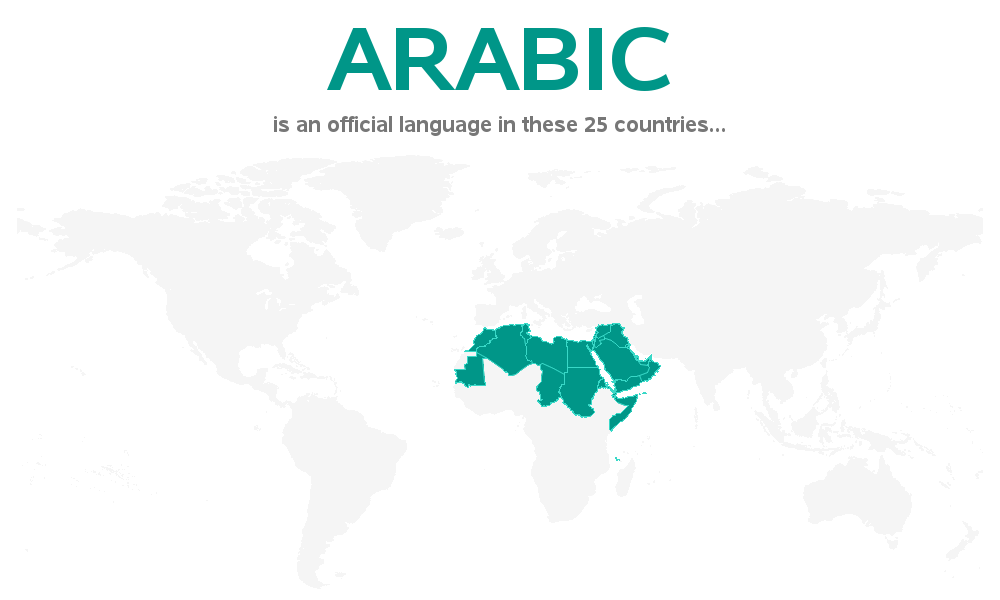Ahlan everyone! Today, let’s talk about Arabic.
WHY ARABIC?
Arabic counts 422 million speakers in both the Arab and non-Arab World. This makes it the 5th most spoken languages in the World, and it is one of the six official languages of the United Nations. There are around 25 Arab speaking countries where Arabic is recognized as the official or co-official language including Saudi Arabia, Algeria, Jordan, Lebanon, Morocco, Oman, Tunisia, Sudan, Palestine etc, spacing from the Middle East to Africa. Nevertheless, Arabic is the religious language of 1.8 billion Muslims around the World. In fact, Arabic is an ancient and sacred language. Arabs and Muslims have a deep connection to the Arabic language. For this reason, and several other, Arabic translation are very important.
HERE’S WHY
- If you want to expand your business in the Arab market it is important that you can relate to the Arabic culture and create deep relationships with your partners and customers. A great way to do so is to connect with them in their own language. This will enable you to maintain a strong and loyal connection.
- As 90% of online shoppers chose to buy services and products of which the description is available in their own language. Taking this into consideration and knowing that more than 237 million internet users are Arabic Speakers, not having the translation available in Arabic would be a huge, missed opportunity!
- Arabic speakers are big on social media platforms. According to the World Association of News Publishing An average person in the Middle East is active on about 8.4 social media platforms during any given month. In the UAE, that average is 10.5 accounts – the highest per person, globally. To reach these potential users and clients companies and organizations must start creating content in Arabic and localized for the Arabic World.
- Even though English is widely spoken across Arab countries not everyone speaks English. This is a clear reason why Arabic translations are important!
A BIT OF HISTORY
Arabic is a Semitic language that dates to the 4th century A.D. It originated in the Arabian Peninsula and was first spoken by nomadic tribes that lived in the Northwest. When the nomadic tribes started to travel out of the Peninsula, they spread the language which, in contact with local languages, developed into several dialects. Thanks to the Arabic Conquests during the 7th century C.E, Arabic spread to North Africa and the Iberian Peninsula. The Arabic language is characterized by diglossia. This means that there is a written, standard Arabic, “Modern Standard Arabic”, and a spoken, colloquial Arabic. MSA is used in reading, writing, it is used by newspapers and official websites. It descends from the language of the Qur’an. For this reason, Arabs consider it the purest form of Arabic. Colloquial dialects are classified into five groups: Maghrebi, Egyptian, Mesopotamian, Levantine, and Peninsular Arabic.
INTERESTING FACTS
1. Arabic constructs words from basic roots.
This is a huge help when it comes to learn words and verbs because from a root you can derive many terms. The three-letters roots convey an idea.
Here are a few examples:
The root k-t-b carries the meaning “writing”.
| He wrote | kataba | كَتَبَ |
| writer | kātib | كَاتِب |
| book | kitāb | كِتَاب |
| office;desk | maktab | مَكْتَب |
| library | maktaba | مَكْتَبَة |
| I write | aktubu | أَكْتُبُ |
2. Arabic has at least 14 different words for “love”
Arabic is complicated, rich, expressive and has often several words that express the same idea but with a slight difference. This makes the language beautiful but also tricky! The most common one is جب, “hubb”. The other words describe a specific stage of falling in love.
3. You probably already know several Arabic words!
قهوة à QAHWA, coffee
زرافة à GIRAF, giraffe
صفّة à SUFFA, sofa
قطن à QUTUN, cotton
الكيمياء à AL-KIMIA, alchemy
الكحل à AL-KUHUL, alcohol
Arabic is a very interesting, beautiful and complicated language. Find out how we can help you creating the best content in this language!

